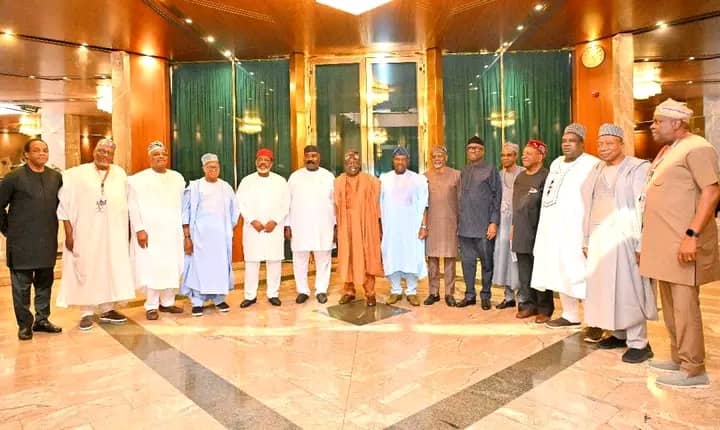Members of the Class of 1999 Governors yesterday called on President Bola Ahmed Tinubu to shift focus from temporary relief measures to sustainable job creation by establishing cottage industries across the country’s 774 local government areas.
The former governors, led by Chief Lucky Igbinedion of Edo State, visited the president at the State House, Abuja, where they presented a raft of suggestions to tackle what they described as deepening economic pain, unemployment, and insecurity in rural communities.
The delegation included notable figures such as James Ibori (Delta), Niyi Adebayo (Ekiti), Adamu Muazu (Bauchi), Joshua Dariye (Plateau), Victor Attah (Akwa Ibom), Adamu Aliero (Kebbi), Sam Egwu (Ebonyi), Jolly Nyame (Taraba), Boni Haruna (Adamawa), Saminu Turaki (Jigawa), Donald Duke (Cross River), and George Akume (Benue), who now serves as Secretary to the Government of the Federation.
Speaking after the closed-door meeting, Chief Igbinedion said their mission was both personal and national: a reunion with “one of our own” who is now President, and an appeal for stronger policies to stem hardship.
“We came to see one of our own in the Class of ’99 and to bring up topics about the state of the nation. We spoke about the security situation of the nation, the economy and, of course, agriculture,” Igbinedion said.
He emphasised that the president “showed deep concern” about their observations and welcomed their ideas on how to alleviate suffering, especially for those in rural Nigeria who have borne the brunt of inflation and unemployment.
The former Edo governor was spoke about the limits of short-term relief measures.
“What is most important is let’s create industries—especially cottage industries—that can employ people, rather than just giving out palliatives,” he stressed. “If you give palliatives to somebody today, what happens tomorrow? If he has ₦5,000 in the morning, what is he going to do by lunchtime or dinner time? ₦5,000 cannot buy much.”
He argued that a network of micro-industries, from agro-processing hubs to small-scale manufacturing, would generate enduring jobs and revive local economies.
“We implored him to try as much as possible to create cottage industries in all the local governments of the Federation where people can be employed,” Igbinedion added.
The group also linked economic revival to national security, warning that no investment—big or small—could thrive without stability.
“We told him, without security, there can be no progress, there can be no stability,” Igbinedion said.
President Tinubu, they reported, listened attentively and pledged to keep his “doors open” to further dialogue, describing their proposals as “fruitful and constructive.”
The visit comes at a time when the administration’s palliative programmes—cash transfers and food distributions—are facing growing criticism for being unsustainable. The ’99 Governors’ intervention reflects a broader call for structural solutions to hunger and unemployment, especially in rural Nigeria where the economic strain is most severe.
Igbinedion captured the mood of the meeting with a note of cautious optimism:
“He appreciated all we came to tell him. He assured us that whatever suggestions, way forward, that we might have, his doors are always open for such conversations.”
For many Nigerians, the challenge now is whether the push for cottage industries can move from suggestion to strategy—and from strategy to reality.
We’ve got the edge. Get real-time reports, breaking scoops, and exclusive angles delivered straight to your phone. Don’t settle for stale news. Join LEADERSHIP NEWS on WhatsApp for 24/7 updates →
Join Our WhatsApp Channel










